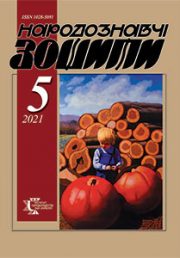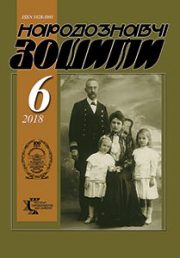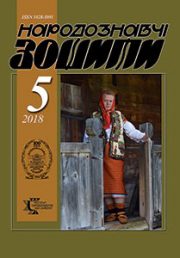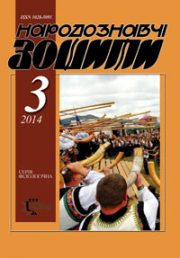The Ethnology Notebooks. 2020. # 6 (156), 1445—1453
УДК 82-311.2+398.223:930.2/394
DOI https://doi.org/10.15407/nz2020.06.1445
Iryna KOVAL-FUCHYLO
- ORCID ID: https://orcid.org/0000-0003-4048-914
- Dr. Philology, Older Scientific Worker,
- Rylsky Institute for Art Studies, Folklore and Ethnology,
- Ukrainian National Academy of Sciences,
- 4, Hrushevskoho str., 01001, Kyiv, Ukraine,
- e-mail: koval-fuchylo@ukr.net
MEMORY ABOUT FLOOD: DOVZHENKO’S CREATIVITY AND ORAL NARRATIVES
The article provides a comparative analysis of the main semantic concepts in the works of the classic of Ukrainian cinema, writer Olexander Dovzhenko and oral stories about the flooding of the territories as a result of the hydroelectric power stations construction. The main focus is on the concepts home, land, water, sacred places. Their semantics is consonant in Dovzhenko’s works and in the oral narratives about flooding. In his diary notations, O. Dovzhenko several times elaborated the scene of mourning after the house before its demolition. Memoirs of our respondents, migrants from flooded areas, show that this is how, with crying and wailing, people said goodbye to their homes. These facts are due to the all-Ukrainian beliefs and ideas associated with the house as one of the central concepts in the mythopoetic picture of the world. The traditional people’s consciousness could not accept the situation when the house lost its main purpose — to be a protection for man; when the house depreciated and then collapsed. The common place of oral narratives about the flooding and Dovzhenko’s diary notations about the construction of the dam is the emphasis on the land loss that will be under the water of the reservoir, as well as the idea that these reckless land losses could have been avoided.
Dovzhenko being between the propaganda requirement and the historical facts, managed to express the people’s truth about the flooding of the land, and to satisfy the demands of the state propaganda. Despite the passion for the «transformation of nature», Dovzhenko, primarily in diary notations, was able to convey the popular perception of the new sea and the structure of the dam on the Dnipro as the merciless devastation of Ukrainian land.
The purpose of this article is to show that in his works O. Dovzhenko first of all depicted the people’s pain, experience due to the loss of land, house, village, and does not glorify the construction of the man-made sea.
Chronological boundaries — 1950—1970.
The study used typological, structural and functional methods and the method of field research.
Keywords: Olexandr Dovzhenko’s notations, oral stories, forced migration, concept of the house, lamentation.
REFERENCES
- Pul’ter, S.O. (1970). Studying O. Dovzhenko’. Work at School. Kyiv [in Ukrainian].
- Ryl’sky, M.T., & Babyshkin, O. (Ed.). (1959). A poem about the sea. Olexander Dovzhenko: Coll. Memories and Articles about the Artist (Pp. 109—112). Kyiv [in Ukrainian].
- Dovzhenko, O.P. (2004). Pages of the Diary (1941—1956). Kyiv [in Ukrainian].
- Pisarevsky, D.S. (1959). Alexander Dovzhenko and his «Poem of the Sea». Moscow [in Russian].
- Koba, S.L. (1979). Alexander Dovzhenko. Life and Work. Kyiv [in Ukrainian].
- Kazin, A.L. (2003). «Poem of the Sea» by Alexander Dovzhenko. Russian beauty. St.-Petersburg. Retrieved from: artkavun.kherson.uа [in Russian].
- Ageeva, V., & Trymbach, S. (Ed.). (2014). «I» and Romance: the Dissolution of Olexander Dovzhenko. Dovzhenko without Make-up: Letters, Memories, Archival Finds (Pp. 5—39). Kyiv [in Ukrainian].
- Trymbach, S., & Ageeva, V. (Eds.). (2014). Dovzhenko and Leaders (Stalin — Khrushchev — Beria). Dovzhenko Without Make-up: Letters, Memories, Archival Finds (Pp. 193—263). Kyiv [in Ukrainian].
- Dovzhenko, O.P., & Trymbach, S. (Ed.). (2015). Diary Notations, 1939—1956. Kharkiv [in Ukrainian].
- Dovzhenko, O.P. (1960). Poem about the Sea. Kyiv [in Ukrainian].
- Koval-Fuchylo, I.M., & Ivashkiv, V. (Ed.). (2014). Ukrainian Lamentations: Anthropology of Tradition, Poetics of the Text. Kyiv [in Ukrainian].
- Koval-Fuchylo, I. (Ed.). (2012). Lamentation. Kyiv [in Ukrainian].
- Dovzhenko, O.P., Korogodsky, R. (Ed.). (1994). Lord, Send me Strength: Diaries, Film Stories, Stories, Folklore Records, Letters, Documents. Kharkiv [in Ukrainian].
- Koval-Fuchylo, I. (2016). The concept of home in stories of forced resettlement. Lemkos, Boykos, Ruthenians: history, modernity, material and spiritual culture (Vol. 6, pp. 147—158). Slupsk [in Ukrainian].
- Lyuboev, Peter. «Poem About the Sea»: Dovzhenko’s Prose about Stalin’s Devastation. Retrieved from: ktm.ukma.edu.ua [in Ukrainian].







